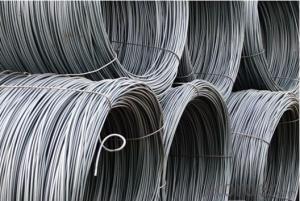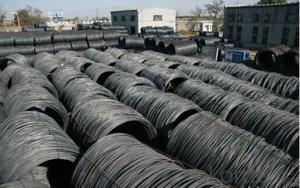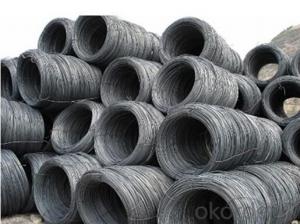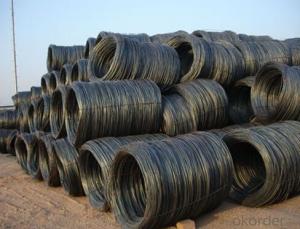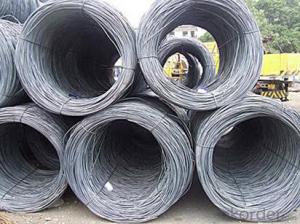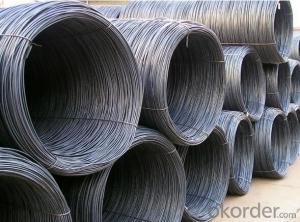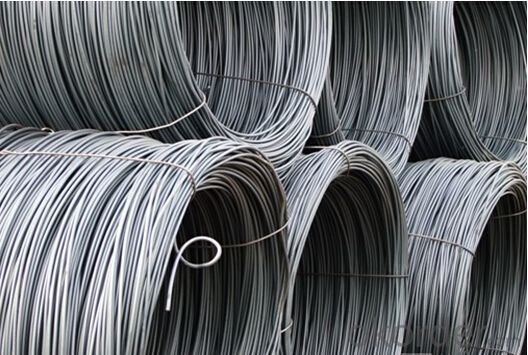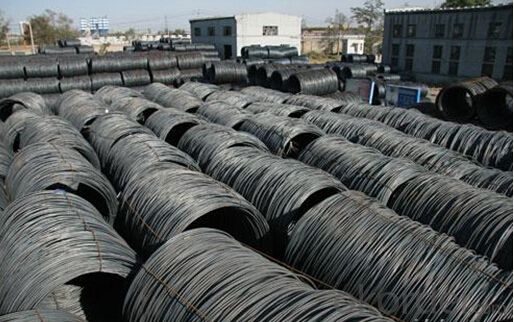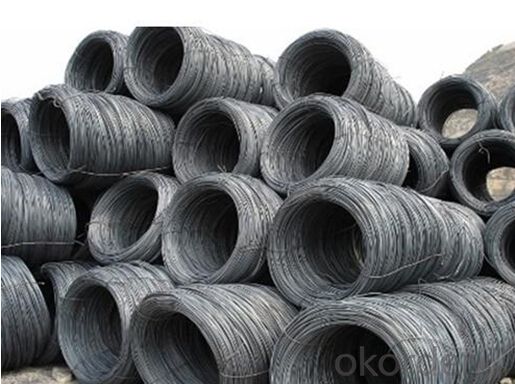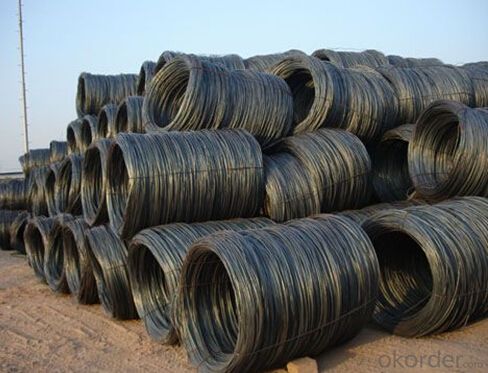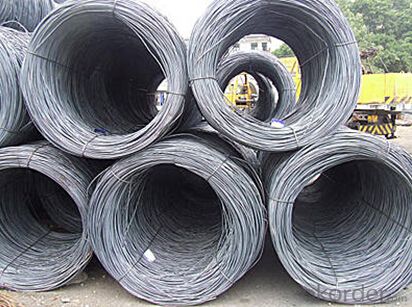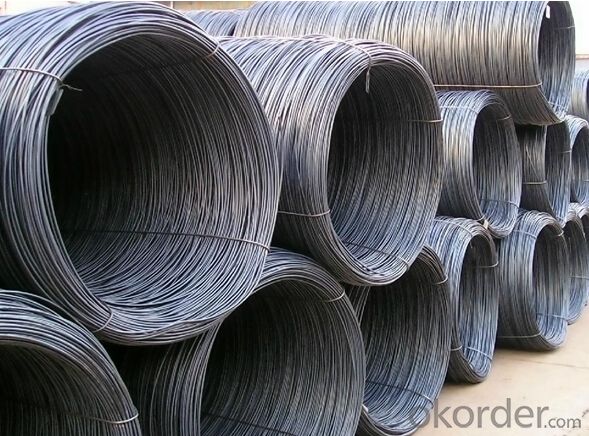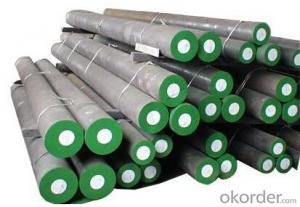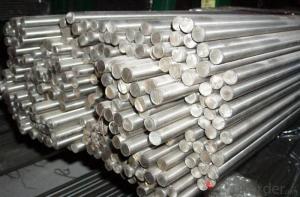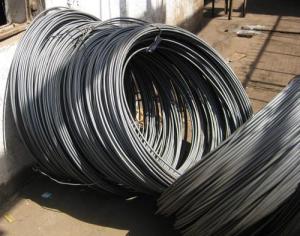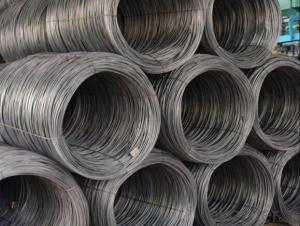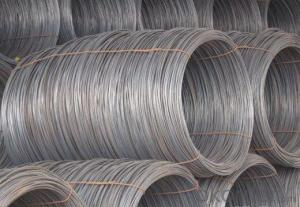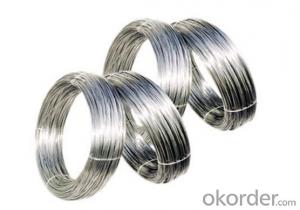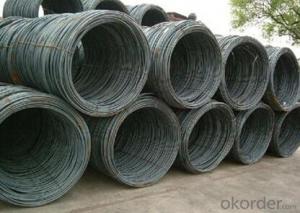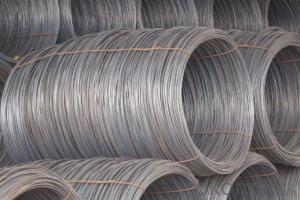m.s Wire Rod in Coils SAE1006/1008/1010/1012
- Loading Port:
- Tianjin
- Payment Terms:
- TT OR LC
- Min Order Qty:
- 10 m.t.
- Supply Capability:
- 10000 m.t./month
OKorder Service Pledge
OKorder Financial Service
You Might Also Like
Specification
m.s Wire Rod in Coils SAE1006/1008/1010/1012
Details of the m.s Wire Rod in Coils SAE1006/1008/1010/1012
| Steel Grade | Q195-Q235,Q235,SAE 1008-1018 Hot Rolled Steel Wire Rod |
| Diameter | 5.5, 6.5, 7,8, 9,10, 12,14mm.etc. |
| Coil weight | 2m.t. |
| Application | drawing, construction materials, machinery parts,construction for Houses, Bridges, Roads,Packing |
| Deliver Time | 25-30 days after receipt of L/C or deposit by T/T |
| Packing | In coils, loading in container or by bulk vessel |
| Payment terms | 1).100% irrevocable L/C at sight. |
| 2).30% T/T prepaid and the balance against the copy of B/L. | |
| 3).30% T/T prepaid and the balance against L/C |
| Chemical Composition(%) | ||||||
| C | Mn | Si | S | P | Cr | |
| SAE1006B | 0.03~O.07 | ≤0.32 | ≤0.30 | ≤0.045 | ≤0.040 | 0.3-0.35 |
| Mechanical properties | ||||||
| Yield strength(N/mm2) | Tensile strength(N/mm2) | Elongation(%) | ||||
| 250-280 | 350-380 | ≥32 | ||||
| Grade | Chemical Composition(%) | |||||
| C | Mn | Si | S | P | Cr | |
| SAE1008B | 0.10max | 0.3~O.50 | 0.15max | 0.050max | 0.040 max | 0.3-0.35 |
| Mechanical properties | ||||||
| Yield strength(N/mm2) | Tensile strength(N/mm2) | Elongation(%) | ||||
| ≥195 | 315-430 | ≥30 | ||||
Supplier of the m.s Wire Rod in Coils SAE1006/1008/1010/1012
CNBM International Corporation is the most import and export platform of CNBM group(China National Building Material Group Corporation) ,which is a state-owned enterprise, ranked in 270th of Fortune Global 500 in 2015.
With its advantages, CNBM International are mainly concentrate on Cement, Glass, Iron and Steel, Ceramics industries and devotes herself for supplying high quality series of refractories as well as technical consultancies and logistics solution.
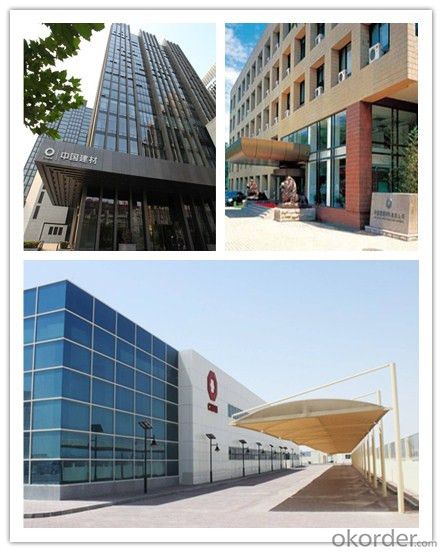
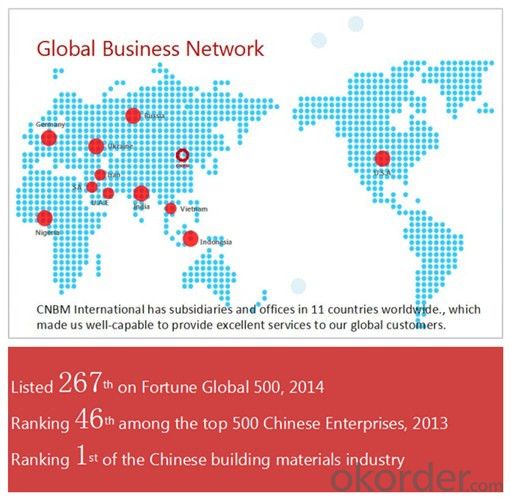
Delivery of the m.s Wire Rod in Coils SAE1006/1008/1010/1012
Packaging Detail | Sea worthy packing /as per customer's packing instruction |
Delivery Detail | 15 ~ 40 days after receiving the deposit |
Products Show
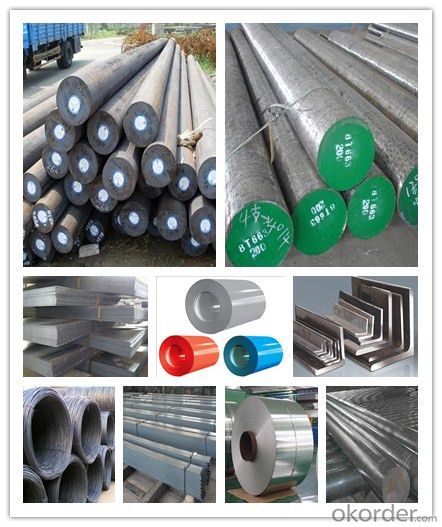
FAQ:
Are you a trading company or manufacturer? | Manufacturer |
What’s the MOQ? | 3 metric ton |
What’s your delivery time? | 15-35 days after downpayment received |
Do you Accept OEM service? | Yes |
what’s your delivery terms? | FOB/CFR/CIF |
What's the Payment Terms? | 30% as deposit,70% before shipment by T/T |
Western Union acceptable for small amount. | |
L/C acceptable for large amount. | |
Scrow ,Paybal,Alipay are also ok | |
Why choose us? | Chose happens because of quality, then price, We can give you both. Additionally, we can also offer professional products inquiry, products knowledge train (for agents), smooth goods delivery, excellent customer solution proposals. |
What's your available port of Shipment? | Main Port, China |
What’s your featured services? | Our service formula: good quality+ good price+ good service=customer's trust
|
Where are your Market? | Covering more than 160 countries in the world |
- Q: Can special steel be used for manufacturing tools?
- Yes, special steel can be used for manufacturing tools. Special steel is often preferred for tool production as it offers superior strength, durability, and resistance to wear and tear. It also allows for the creation of tools with specific properties, such as high heat resistance or corrosion resistance, making it suitable for various applications in industries like automotive, aerospace, and construction.
- Q: What is the impact of grain size on the mechanical properties of special steel?
- The impact of grain size on the mechanical properties of special steel is significant. Generally, a finer grain size enhances the strength, hardness, and toughness of the steel, while a coarser grain size can result in reduced mechanical properties. This is because a finer grain size provides more grain boundaries, which act as barriers to dislocation movement and contribute to strengthening the material. Additionally, finer grains promote better uniformity in the distribution of stress and strain, leading to improved mechanical performance. Therefore, controlling and optimizing the grain size is crucial in achieving the desired mechanical properties of special steel.
- Q: How is precipitation-hardening steel used in aerospace applications?
- Precipitation-hardening steel is commonly used in aerospace applications due to its exceptional strength-to-weight ratio and excellent corrosion resistance. It is extensively used in critical components such as aircraft structural parts, landing gear, engine components, and fasteners. The precipitation hardening process involves heating and cooling the steel to create a fine dispersion of precipitates, which significantly enhances its mechanical properties. This steel's high strength allows for the construction of lighter and more fuel-efficient aircraft, while its corrosion resistance prolongs the lifespan of aerospace components, ensuring safe and reliable operation.
- Q: Can special steel be used in the manufacturing of tools?
- Yes, special steel can be used in the manufacturing of tools. Special steels, such as high-speed steel, tool steel, and alloy steel, are specifically designed to have exceptional strength, hardness, and durability properties. These characteristics make special steel ideal for tool manufacturing, as it can withstand high temperatures, resist wear and corrosion, and provide the necessary toughness required for various cutting, shaping, and drilling applications.
- Q: What are the different special steel products available in the market?
- There are several different special steel products available in the market, including stainless steel, tool steel, alloy steel, high-speed steel, and carbon steel. Each type of special steel has unique properties and is used for various applications in industries such as construction, automotive, aerospace, and manufacturing.
- Q: What are the safety benefits of using special steel?
- Using special steel can provide several safety benefits in various applications. One of the main advantages is its enhanced strength and durability compared to traditional steel. Special steel is often designed to withstand extreme conditions, such as high temperatures or corrosive environments, making it ideal for applications in industries like aerospace, automotive, and oil and gas. The high strength of special steel allows for the construction of safer and more reliable structures. It can withstand heavy loads, reducing the risk of structural failures or collapses. This is crucial in industries where the safety of workers, equipment, and the general public is of utmost importance. Another safety benefit of special steel is its resistance to corrosion. Corrosion can weaken structures and compromise their safety. Special steel is often alloyed with elements like chromium, nickel, or molybdenum, which provide excellent corrosion resistance. This makes it suitable for applications in marine environments, chemical processing plants, or any setting where exposure to moisture or chemicals is a concern. Special steel is also known for its ability to retain its mechanical properties at high temperatures. This makes it an excellent choice for applications where heat resistance is crucial, such as in the construction of fire-resistant structures or in the manufacturing of industrial ovens and furnaces. By using special steel in these applications, the risk of structural failure or fire-related accidents can be significantly reduced. Furthermore, special steel can offer improved fatigue resistance, which is important in applications subject to cyclic loading or vibration. Fatigue failure can occur when a material experiences repeated stress over time, leading to cracks and eventual failure. Special steel can be engineered to have excellent fatigue properties, reducing the likelihood of unexpected failures and improving the overall safety of structures or equipment. In summary, the safety benefits of using special steel include enhanced strength, durability, corrosion resistance, heat resistance, and fatigue resistance. These properties make special steel a reliable choice for industries where safety is a top priority, ensuring the protection of workers, equipment, and the general public.
- Q: What is the significance of tensile strength in special steel?
- Tensile strength is of great significance in special steel because it determines the steel's ability to withstand stretching or pulling forces without breaking or deforming. This property is crucial in various industries, especially in manufacturing and construction, where high tensile strength is required for structural integrity and safety. Special steel with superior tensile strength can withstand heavy loads, resist impacts, and provide durability, making it highly sought after in applications such as building infrastructure, automotive manufacturing, and aerospace engineering.
- Q: What are the different impact-resistant grades of special steel?
- There are various impact-resistant grades of special steel, including AR400, AR500, AR550, and AR600. These grades are specifically designed to withstand high levels of impact and abrasion, making them suitable for applications such as construction equipment, industrial machinery, and mining tools.
- Q: What are the main factors affecting the corrosion fatigue strength of special steel?
- The main factors affecting the corrosion fatigue strength of special steel include the corrosive environment, the presence of aggressive substances, the level of stress applied, the frequency of stress cycling, and the microstructure and composition of the steel itself.
- Q: What are the main factors affecting the fracture toughness of special steel?
- The fracture toughness of special steel can be affected by several key factors, encompassing: 1. Alloy composition: The fracture toughness of the steel can be greatly influenced by its specific chemical composition, including the type and amount of alloying elements. Elements like chromium, nickel, and molybdenum have the potential to enhance toughness by promoting the formation of fine-grained microstructures or improving the steel's ability to resist crack propagation. 2. Heat treatment: Determining the fracture toughness of the steel is heavily reliant on the temperature and duration of the heat treatment process, as well as the subsequent cooling. Proper heat treatment can refine the microstructure and eliminate any potential defects, thereby enhancing the steel's resistance to fracture. 3. Microstructure: The fracture toughness of the steel is profoundly impacted by its microstructure, encompassing grain size and distribution, phase composition, and the presence of inclusions. Generally, finer-grained structures exhibit higher toughness due to their improved resistance to crack propagation. 4. Existence of defects: The presence of defects, such as cracks, voids, or inclusions, within the steel can act as stress concentrators, ultimately diminishing its fracture toughness. These defects can initiate cracks and facilitate their propagation, ultimately leading to reduced toughness. 5. Temperature: Fracture toughness is contingent upon temperature, and the behavior of special steel can significantly vary at different temperature ranges. Some steels exhibit improved toughness at lower temperatures due to microstructural transformations, while others may experience decreased toughness at elevated temperatures due to material softening. 6. Loading conditions: The fracture toughness of special steel can also be impacted by the loading conditions, including the rate of loading or the presence of dynamic loading. Higher loading rates or dynamic loading can result in reduced toughness, as the steel may not have sufficient time to deform and absorb energy before fracturing. 7. Mechanical properties: The mechanical properties of the steel, such as strength, hardness, and ductility, can influence its fracture toughness. Higher strength and hardness can sometimes lead to decreased toughness, as the material becomes more brittle. However, a balance between strength and toughness can be achieved by carefully selecting the alloy composition and heat treatment parameters. In summary, the fracture toughness of special steel is determined by a complex interplay of various factors, including alloy composition, heat treatment, microstructure, defects, temperature, loading conditions, and mechanical properties. By optimizing these factors, the fracture toughness of special steel can be enhanced for specific applications.
Send your message to us
m.s Wire Rod in Coils SAE1006/1008/1010/1012
- Loading Port:
- Tianjin
- Payment Terms:
- TT OR LC
- Min Order Qty:
- 10 m.t.
- Supply Capability:
- 10000 m.t./month
OKorder Service Pledge
OKorder Financial Service
Similar products
Hot products
Hot Searches
Related keywords
